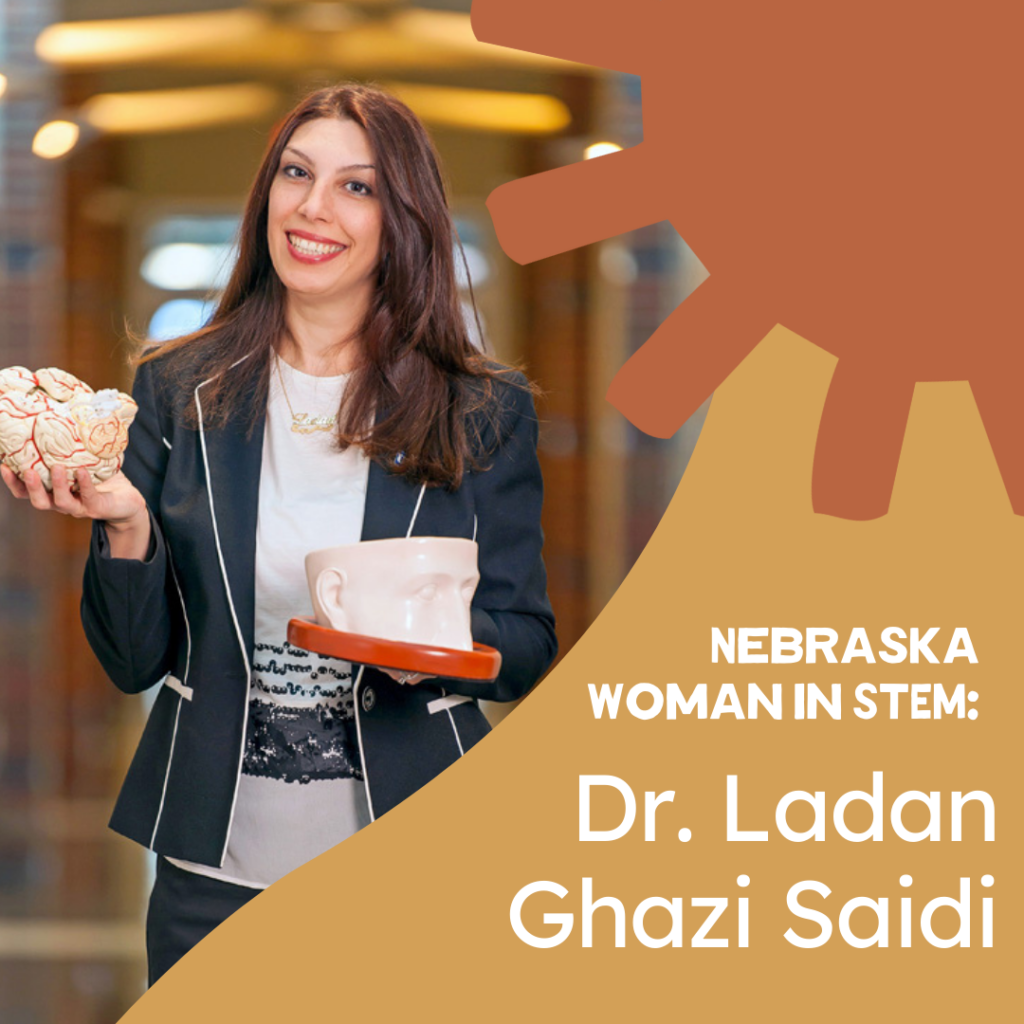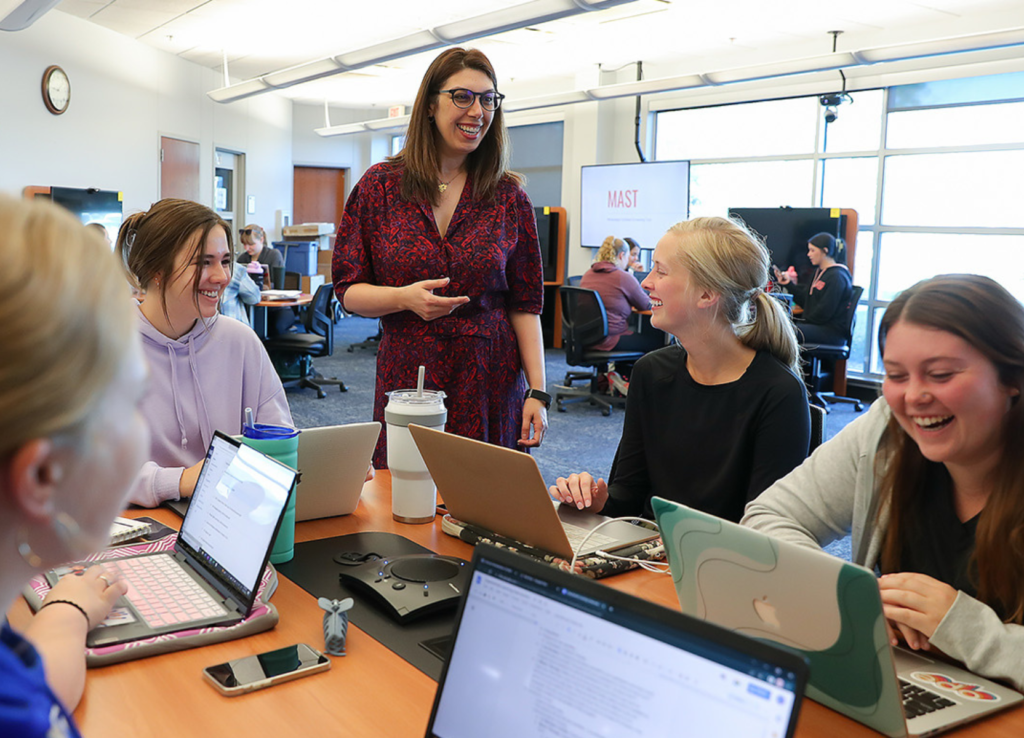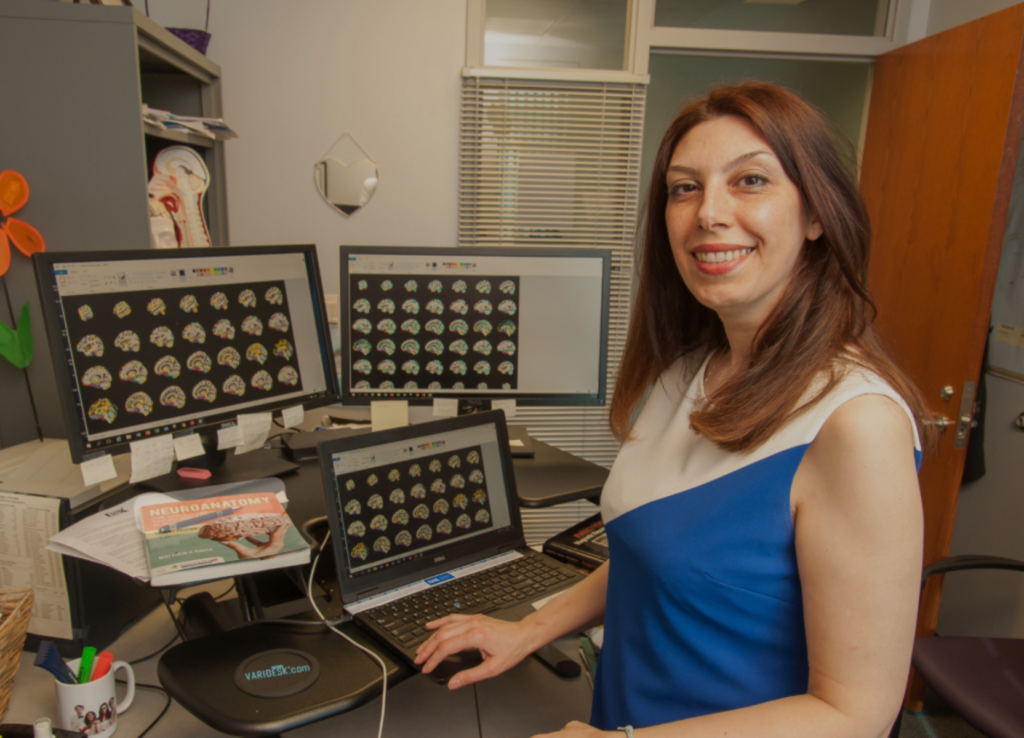Nebraska Women in STEM talked to Dr. Ladan Ghazi Saidi about her journey from Iran to Kearney, Nebraska, where she works as a professor and researcher.

Growing up in Iran, Dr. Ladan Ghazi Saidi was surrounded by science. Her parents were both university professors and most of her aunts and uncles were doctors or held positions in the healthcare field.
Access to college and career options is very different in Iran than in the United States. Every student takes the same college entrance exam, is ranked against all other graduating students in the country, and their choice of college and career is determined by their score. Ghazi Saidi’s score made her ineligible to become a doctor but was high enough to study any science field at the most prestigious universities.
Her father suggested she study biology, since it is the “mother of all sciences” and would allow her to do anything she wanted in grad school. Ghazi Saidi followed his recommendation, but it wasn’t until her last semester of undergrad that she found the specific type of biology she wanted to study for the rest of her career.
In a neuroscience course Ghazi Saidi took, her professor taught a lesson about language processing, and how second languages are processed differently than your mother tongue. “That specific lesson really inspired me, and I realized that’s what I want to do,” she explained.
Ghazi Saidi started looking into graduate programs in other countries where she could study neuroscience while also expanding her knowledge of languages. She found the University of Montreal in Canada which would allow her to do her work in English, a language she already knew, while also learning French, the language spoken in Montreal.
Once she graduated with her PhD, she became a postdoc researcher. In addition, she took a job as a lab manager and mentored undergraduate students. “Not only did this give me a little bit of money, but it also gave me a lot of experience,” said Ghazi Saidi. “I enjoyed the teaching aspect of it and getting to explain the basic science behind everything they were doing.”
Ghazi Saidi’s workplace was invested in aging research and developed her interest in how speaking another language affects aging. Her research found that speaking two or more languages postpones Alzheimer’s and Parkinson’s disease.


Ghazi Saidi next took a fellowship in the United States at Cleveland Clinic Lou Ruvo Center for Brain Health in Nevada where she could better study neurodegenerative diseases. Ghazi Saidi wondered what would happen if someone learned a second language later in life. “I wondered if they would gain the same advantages,” explained Ghazi Saidi. “We’re getting great results. They’re showing that learning a new language in older adults can help boost their cognitive performance, and the interesting thing is the boost is higher in people who spend more time learning the new language.”
When her fellowship wrapped up, she was faced a tough choice about where in academia to seek employment. While some of her friends were focused on wanting to be in prestigious locations, finding work-life balance was more important to her.
“I wanted a job that gives me the opportunity to teach and do the research I want to do, while also allowing me enough time to enjoy with my family,” explained Ghazi Saidi. “I have two kids, a new partner, and a couple of pets and I want to enjoy my life with them. I love traveling and I want to be able to travel.”
She interviewed at multiple universities but was impressed by the people at the University of Nebraska Kearney (UNK).
“It was a happy place. People were genuinely welcoming and friendly, and I realized that at the end of the day, I’ll be spending more time in the workplace than even at home with my family, so I decided to go with the place where people were nice over the place that paid me a bit more,” expressed Ghazi Saidi.
“UNK has allowed me to do the research I want. I have multiple ongoing projects, and although it’s a lot of work, it’s the work I love,” said Ghazi Saidi.
Another one of her favorite parts about being at UNK is that she is allowed to go to different campuses across the University of Nebraska System and use their facilities to further her research. She is also an affiliate faculty at UNL Center for Brain, Biology and Behavior.
Ghazi Saidi’s advice for other women in STEM is to believe in your dreams. “This comes from a little girl in Iran. The dreams I had at the time were big and seemed far-fetched since they took place in a country I didn’t even know if I would get to.”
“It wasn’t easy. I just talked about the achievements and skipped over all of the hardships, financial struggles, language barriers, and adaptations I had to make,” said Ghazi Saidi.
During her journey, Ghazi Saidi married and divorced, was far from her family, and didn’t always have friends to watch her kids as she moved frequently and didn’t know anyone who she could trust to babysit. Ghazi Saidi explains that after a while she started bringing her baby to conferences when she had to, and she realized nobody seemed to care when she did. “I’m really glad I didn’t choose between having a family and my career. It’s possible to do both,” said Ghazi Saidi.
“Though there were many things that made my journey more complicated, that was a choice! I think it was all worth it because now I’m fluent in three languages, and I’m happy that I’ve done that,” says Ghazi Saidi.”
“In the end, believe in yourself, believe in your dreams, and pursue them.”